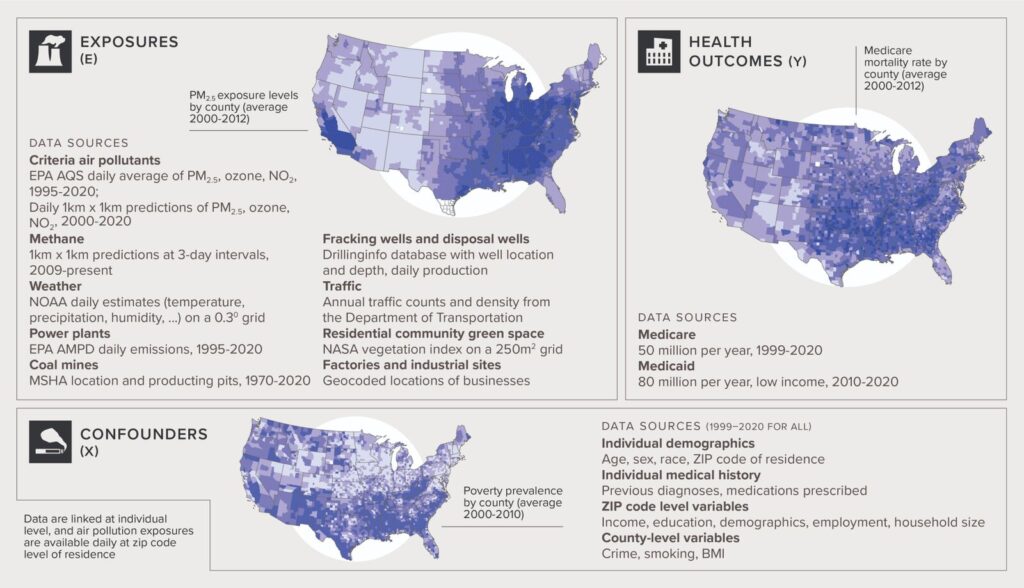Hottest temperatures in history, flooding, droughts, wildfires, and air pollution. The New York Times article How Hot Was July? Hotter Than Ever, Global Data Shows is one of many recent news stories that records the alarming symptoms of climate change.
We monitor the planet’s health, but what effect do these events have on our health? How frequently will they occur and where? Which regulatory actions are most effective? Who is most vulnerable? Francesca Dominici and her team at the Harvard T.H. Chan School of Public Health are working to find the answers. They are using data science — or doing science through data — to assess causal links between climate change-related exposures and health using unprecedented amounts of existing observational data.
Data science and rigorous methodology as the foundation for policy
With data literally at our fingertips, it is fact-based science that should inform policy and drive solutions for climate change, not politics and lobbying. Dominici and her team have been studying the health impact of exposure to air pollution (fine particulate matter [PM2.5]) on over 60 million Americans enrolled in Medicare (those older than 65) for the period 2000 to 2012. Figure 1 illustrates an overview of the data. Their research to date has shown that lowering levels of PM2.5 by just one microgram per cubic meter could save 12,000 lives each year. Men, people of color, and low-income populations had higher risks of premature death from PM2.5, with people of color three times more likely to die prematurely, likely because of their location, less access to health care, and other existing comorbidities.

Combatting climate change not only helps the climate, but also reduces harmful substances such as particulate matter, sulfur dioxide, nitrogen oxides, and mercury that are directly harming humans. By prioritizing climate change and reducing greenhouse gases emissions, not only will we save the polar bears and the glaciers for future generations, but we can prevent asthma, air pollution-related hospitalizations, and premature death for this generation. Bottom line — policies that minimize air pollution will decrease healthcare costs, help combat disease, and address climate change.
Dominici and her team’s research, which focuses on finding climate change solutions via the science of data, presents just one of the many examples of the enormous potential for this new discipline to transform policy and address global issues. Data science can tell us when and where climate change disasters (heat waves, wildfires, and droughts) will happen. With machine learning we can analyze terabytes of data from satellites, outputs of atmospheric chemistry models, meteorology, and land-use variables to predict their future occurrences. For example, increased frequency in wildfires due to climate change puts more communities at risk of prolonged exposure to harmful smoke. Dominici’s team is developing methods to identify individual and societal factors that increase a person’s vulnerability to these climate change-related exposures.
Businesses can join the fight against climate change by contributing research data on their practices, emissions, the populations they serve, and their employees’ health. Businesses can also use the results of data science to protect workers’ health, reduce healthcare costs, and implement the most cost-effective strategies to reduce their own greenhouse gas emissions.
The future of data science
To fully harness the power of data science we need to develop scalable research data platforms and rigorous methodologies. Data science methods must be developed and validated, and be accessible and replicable, to present a clear path for other researchers to apply their methods to large-scale questions. Government should facilitate access to their own databases that measure: a) proxy levels of air pollution from satellites; b) ground air pollution levels from the US Environmental Protection Agency’s monitoring networks; c) weather variables; d) socioeconomic data; and e) health from administrative databases and electronic medical records. Funding agencies and philanthropic efforts should invest in data science efforts to fight climate change. Academia should prioritize cross-disciplinary research in data science to solve big questions.
Unlocking the power of data with sound methodology to solve intractable challenges is what prompted the formation of the Harvard Data Science Initiative (HDSI). The HDSI convenes leading thinkers in data science, providing the venue, expertise, and resources to explore new data-driven approaches to the most important issues facing humanity. HDSI also recently launched the Harvard Data Science Review. This online platform publishes content to provide a crossroads at which fundamental data science research and education intersect with societally important applications from industry, government, and NGOs amongst others. With advancements such as these, Dominici is optimistic that we can harness the power of data science and technology to revolutionize how we use data to solve global issues such as climate change. If this July was any indication, we can’t wait any longer to act, and data science is critical to finding the answers.
